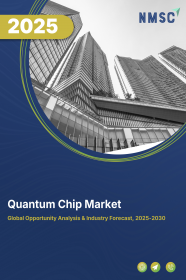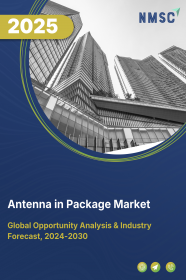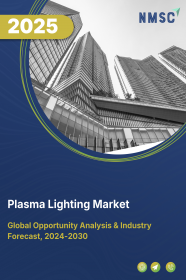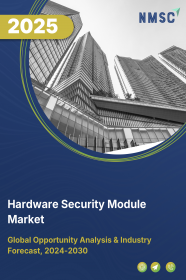
Quantum Chip Market by Type (Superconducting Quantum Chip, Photonic Quantum Chip, Trapped Ion Quantum Chip, Neutral Atom Quantum Chip, and Quantum Dot Chip), by Quantum Chip Fabrication (In-House Fabrication and Outsourced Fabrication), by Application (Quantum Computing, Quantum Cryptography, Quantum Sensing, Quantum Communication, and Others), and by End-User (Healthcare, Telecommunication, Aerospace & Defence, Energy, and Others) – Global Opportunity Analysis and Industry Forecast 2025–2030.
US Tariff Impact on Quantum Chip Market
Trump Tariffs Are Reshaping Global Business
Quantum Chip Market Overview
The global Quantum Chip Market size was valued at USD 0.60 billion in 2024 and is predicted to reach USD 5.58 billion by 2030 with a CAGR of 44.8% from 2025-2030.
Some of the key factors that drives the quantum chip market are increasing investment in military, boosting aerospace expenditure and expansion of semiconductor industry. Additionally, some of the notable players such as Google LLC and International Business Machines Corporation are adopting numerous business tactics such as product launches, acquisition and expansion to maintain their dominance in quantum chip industry. However, the market growth is hindered by high initial investment. On the other hand, the introduction of modular quantum processor is anticipated to create significant future opportunity for the market in the coming years.
Increasing Investment in Military Fuels the Market Growth
Increasing focus on defence boosts the quantum chip market expansion by driving investments in advanced technologies that enhance national security, communication systems, and aerospace capabilities. Due to influx of funds for defence innovation, there is growing demand for quantum processors to support secure communication, encryption, navigation, and advanced simulation as well as its superiority in handling complex calculations.
As per the report published by the Stockholm International Peace Research Institute 2024, the total military expenditure globally increased from USD 2.28 trillion in 2022 to USD 2.44 trillion in 2023 marking a growth rate of 6.8% in just one year of timespan.
Boosting Aerospace Expenditure Drives the Market Growth
The quantum chip industry is driven by increasing aerospace expenditure, fuelled by investments in advanced technologies that enhance aerospace capabilities that includes satellite systems, navigation, and communication infrastructure.
Such microchips deliver the computation capabilities that aerospace systems need for more complex simulations and data to be transferred with integrity. Overall, the entire aerospace system improves as well. The space economy is expected to grow from USD 630 billion in 2023 to USD 1. 8 trillion by 2035, at a rate of 9% per year as per World Economic Forum.
Expansion of Semiconductor Industry Spurs the Market Growth
The quantum chip industry is spurred by the expansion of the semiconductor industry, wherein advancement in quantum hardware development propels a more efficient chip fabrication process. In the semiconductor market expansion comes with innovation in miniaturization, material science, and manufacturing techniques-all important to producing quantum chips. This leads to scaling up in the production of quantum chips with enhanced performance, reliability, and cost-effectiveness.
The World Semiconductor Trade Statistics report states global semiconductor sales summed USD 526.88 billion in 2023 and is projected to reach USD 697.18 billion by 2025, growing 32.3% in 2 years.
High Initial Investment Hinders the Quantum Chip Market Growth
The production of quantum chips requires advanced and specialized techniques such as precise qubit fabrication and quantum error correction mechanisms requiring substantial investment in research and development that adds to the overall costs of quantum hardware hindering smaller companies and startups for adoption.
Introduction of Modular Quantum Processor Creates Future Opportunities
The introduction of modular quantum processor is anticipated to create significant future opportunity for the market in the coming years due to its scalability and durability, addressing key challenges in building large-scale quantum devices.
Based on the University of Chicago in 2024, researchers demonstrated the new design of a superconducting quantum processor with potential architectures in large-scale durable quantum devices. This discovery could lead to driving further generations of next-generation quantum computation, creating various new opportunities towards more powerful efficient and versatile processors.
Market Segmentations and Scope of the Study
The quantum chip market report is segmented on the basis of type, quantum chip fabrication, application, end-user, and by region. On the basis of product, the market is divided into superconducting quantum chips, photonic quantum chips, trapped ion quantum chips, neutral atoms quantum chips, quantum sensor chips, and quantum dots chips. On the basis of quantum chip fabrication, the market is grouped into in-house fabrication and outsourced fabrication. On the basis of application, the market is grouped into quantum computing, quantum cryptography, quantum sensing, and quantum communication and others. On the basis of end-users, the market is divided into healthcare, telecommunication, aerospace and defence, automotive, financial services, energy, and others. Regional breakdown and analysis of each of the aforesaid segments includes regions comprising of North America, Europe, Asia-Pacific, and RoW.
Geographical Analysis
North America region dominates the quantum chip market share, that is likely to continue dominating during the forecast period due to its increasing military expenditure, that requires stronger quantum chips for secure communications, advanced computing and simulations, radars and sensors that could analyse fast. Military spending in the United States grew from USD 834.97 billion in 2022 to USD 849.80 billion in 2024, a 1.7% increase over two years, according to a NATO 2024 report.
Apart from that, a high growth potential in the production of quantum chips is encouraged in this region due to presence of major producers of the quantum chip as Google LLC, Microsoft Corporation, Intel Corporation, International Business Machines (IBM) Corporation, and Amazon.com Inc. presence that invested considerably in quantum R&D.
For instance, in November 2024, IBM in partnership with Pasqal unveiled a unified approach for quantum-enabled supercomputing that would be enabled using Qiskit. This partnership seeks to accelerate quantum and classical hybrid workflows, fostering collaboration between high performance computing centres and quantum hardware providers while promoting market adoption of quantum technologies.
On the other hand, Asia Pacific shows steady rise in the quantum chip industry due to growing interest in space exploration leading to demand for advanced, high-performance computing systems that are reliable and faster at the same time necessitating the use of quantum chip.
According to the report published by the Press Information Bureau (PIB) in October 2024, Indian space economy is valued at USD 8.4 billion in 2024 and is estimated to scale up to USD 44 billion in 2033 marking an increase rate of roughly 423%.
Moreover, growing government initiatives and funding towards infrastructure and quantum research facilities in this region is promoting quantum chip industry. In 2024, the government of India under the National Quantum Mission aims to develop intermediate-scale quantum computers of 50-1,000 qubits that is fostering the start-up systems associated with quantum computing.
Competitive Landscape
Various key market players operating in the quantum chip industry are International Business Machines Corporation, Google LLC, Microsoft Corporation, Intel Corporation, Rigetti Computing Inc., Amazon.com, Inc., Alpine Quantum Technologies GmbH, Atom Computing, Inc, IonQ, Inc., M Squared Lasers Limited, Quantinuum LLC, Xanadu, D-Wave Quantum Systems Inc., QuEra Computing Inc., Quandela, and others. These market players are adopting various strategies such as product launches, acquisition and expansion to maintain their dominance in quantum chip industry.
For instance, in December 2024, Google launched its latest next generation quantum chip named Willow that features reduced error rates, increased qubit counts and enhanced performance providing use-case for real world complex applications.
Additionally, in October 2024, Google LLC acquired invested in QuEra Computing Inc that develops and make available useful, scalable and fault-tolerant quantum computers. This investment complements QuEra Computing Inc’s attempt to accelerate technology advancements in the neutral atom space.
Moreover, in September 2024, International Business Machines Corporation expanded its quantum data centre in Poughkeepsie, U.S.A. operating highest number of utility-scale quantum computers at a single location in the world. This expansion extends the complexity and size of quantum workloads that users run. The Poughkeepsie data centre aims to serve as a global hub for IBM’s Quantum Network as the company extends its worldwide fleet of systems.
Key Benefits
-
The report provides quantitative analysis and estimations of the quantum chip industry from 2025 to 2030, which assists in identifying the prevailing industry opportunities.
-
The study comprises a deep-dive analysis of the current and future quantum chip market trends to depict prevalent investment pockets in the industry.
-
Information related to key drivers, restraints, and opportunities and their impact on the quantum chip industry is provided in the report.
-
Competitive analysis of the key players, along with their market share is provided in the report.
-
SWOT analysis and Porters Five Forces model is elaborated on the study.
-
Value chain analysis in the market study provides a clear picture of roles of stakeholders.
Quantum Chip Market Key Segments
By Type
-
Superconducting Quantum Chips
-
Photonic Quantum Chips
-
Trapped Ion Quantum Chips
-
Neutral Atoms Quantum Chips
-
Quantum Dots Chips
By Quantum Chip Fabrication
-
In-House Fabrication
-
Outsourced Fabrication
By Application
-
Quantum Computing
-
Quantum Cryptography
-
Quantum Sensing
-
Quantum Communication
-
Others
By End-Users
-
Healthcare
-
Telecommunication
-
Aerospace & Defense
-
Automotive
-
Financial Services
-
Energy
-
Others
By Region
-
North America
-
The U.S.
-
Canada
-
Mexico
-
-
Europe
-
The U.K.
-
Germany
-
France
-
Italy
-
Spain
-
Denmark
-
Netherlands
-
Finland
-
Sweden
-
Norway
-
Russia
-
Rest of Europe
-
-
Asia-Pacific
-
China
-
Japan
-
India
-
South Korea
-
Australia
-
Indonesia
-
Singapore
-
Taiwan
-
Thailand
-
Rest of Asia-Pacific
-
-
RoW
-
Latin America
-
Middle East
-
Africa
-
Key Players
-
International Business Machines (IBM) Corporation
-
Google LLC
-
Microsoft Corporation
-
Intel Corporation
-
Rigetti Computing Inc.
-
Amazon.com Inc.
-
Alpine Quantum Technologies GmbH
-
Atom Computing Inc
-
IonQ, Inc.
-
M Squared Lasers Limited
-
Quantinuum LLC
-
Xanadu
-
D-Wave Quantum Systems Inc.
-
QuEra Computing Inc.
-
Quandela
REPORT SCOPE AND SEGMENTATION:
|
Parameters |
Details |
|
Market Size in 2024 |
USD 0.60 billion |
|
Revenue Forecast in 2030 |
USD 5.58 billion |
|
Growth Rate |
CAGR of 44.8% from 2025 to 2030 |
|
Analysis Period |
2024–2030 |
|
Base Year Considered |
2024 |
|
Forecast Period |
2025–2030 |
|
Market Size Estimation |
Billion (USD) |
|
Growth Factors |
|
|
Countries Covered |
28 |
|
Companies Profiled |
15 |
|
Market Share |
Available for 10 companies |
|
Customization Scope |
Free customization (equivalent to up to 80 working hours of analysts) after purchase. Addition or alteration to country, regional, and segment scope. |
|
Pricing and Purchase Options |
Avail customized purchase options to meet your exact research needs. |

















 Speak to Our Analyst
Speak to Our Analyst




















